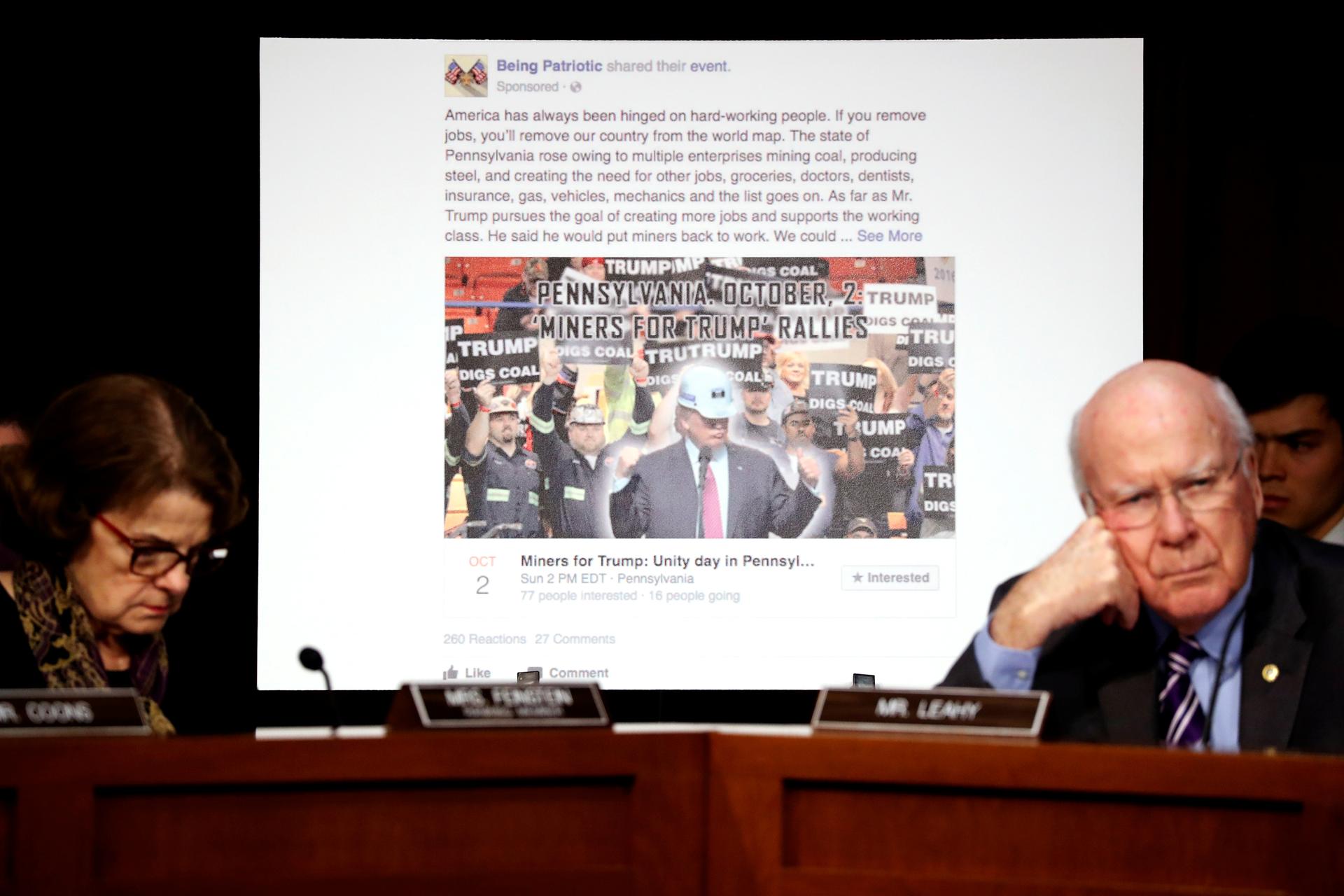Watch: Facebook, Twitter and Google testify in Russia hearings
US Senator Dianne Feinstein (D-CA) (L) and Senator Pat Leahy (D-VT) show a fake social media post for a non-existent "Miners for Trump" rally as representatives of Twitter, Facebook and Google testify before a Senate Judiciary Crime and Terrorism Subcommittee hearing on how Russia allegedly used their services to try to sway the 2016 US elections, on Capitol Hill in Washington, US Oct. 31, 2017.
Moscow insisted Tuesday there is no evidence it interfered in the 2016 US presidential election, after three aides to President Donald Trump's campaign were charged as part of an investigation into Russian efforts to influence the vote.
Ex-campaign chairman Paul Manafort and another former Trump aide appeared in court on Monday, pleading not guilty to conspiracy against the United States, money laundering and several other charges after indictments in the Russia probe were unsealed.
Separately, another former Trump campaign aide, George Papadopoulos, pleaded guilty to lying to the FBI about his Kremlin-related contacts, according to a plea deal revealed the same day.
"We are accused of interfering not only in US elections but also in those of other countries without one piece of evidence," Russian Foreign Minister Sergei Lavrov said, repeating a denial of involvement that Moscow has made before.
There are reports that "we don't just interfere in elections, we manipulate the weather and bring about floods," he quipped.
"Everyone likes to talk but no one can present any facts."
The unsealed indictments were an explosive opening salvo from independent counsel Robert Mueller, who is leading the Russia probe, after months of speculation, spin and obfuscation about possible Trump campaign collusion with Moscow.
While falling short of providing a smoking gun for top-level conspiracy, the charges point to a potential pattern of senior Trump associates looking to Russia and its proxies for political and economic gain.
Manafort, 68, and Rick Gates, 45, were charged with allegedly hiding millions of dollars gleaned from work with Ukrainian politician Viktor Yanukovych and his pro-Moscow political party.
Related: Paul Manafort earned $600,000 a month from pro-Russia party, says Ukrainian report
The pair was released on bail of $10 million and $5 million respectively and placed under house arrest.
Papadopoulos, a former Trump foreign policy advisor, admitted he tried to hide contacts with a Moscow-linked professor who was offering "dirt" on Trump's election rival Hillary Clinton.
The revelations prompted a furious and defiant reaction from Trump, who dismissed allegations of collusion and called on Clinton to be investigated.
'No Collusion!'
"Sorry, but this is years ago, before Paul Manafort was part of the Trump campaign. But why aren't Crooked Hillary & the Dems the focus?????" Trump tweeted. "….Also, there is NO COLLUSION!"
But the charges signal a dramatic new phase in Mueller's investigation, one that holds grave peril for the Trump presidency.
Papadopoulos revealed that he informed Trump and others personally that he could organize a meeting between the then candidate and Russian President Vladimir Putin.
The ex-advisor told the FBI that he had been instructed by an unnamed "campaign supervisor" to meet Russian officials "off the record" if "feasible."
His contacts with Russian sources came to include Putin's niece and the Russian ambassador in London.
White House spokeswoman Sarah Huckabee Sanders suggested Trump did not recall "specific details of the meeting" and that Papadopoulos had only a limited role.
"It was extremely limited; it was a volunteer position. And again, no activity was ever done in an official capacity on behalf of the campaign in that regard."
US intelligence agencies have concluded that Putin ordered a vast influence campaign to help Trump win election, including the hack and release of Democratic Party and Clinton campaign emails.
As Mueller's probe has rumbled forward, Trump and sympathetic media organizations like Fox News have increasingly called the former FBI director's independence into question.
Democrats — who dismiss counter-allegations against Mueller and Clinton as a blatant attempt to divert attention — called for the special counsel to be protected.
Focus on Ukraine
"The president must not, under any circumstances, interfere with the special counsel's work in any way," said top Senate Democrat Chuck Schumer.
"If he does so, Congress must respond swiftly, unequivocally and in a bipartisan way to ensure that the investigation continues."
Manafort was among the participants of a June 9, 2016 meeting at Trump Tower with a Kremlin-linked lawyer that raised suspicions of collusion between the campaign and Moscow.
The gathering was arranged by Trump's eldest son, Donald Jr, in hopes of receiving damaging information on Clinton.
Manafort's indictment made no mention of Russian involvement in the US campaign, however, focusing instead on his earlier Ukrainian ties.
A long-time political operative and consultant, Manafort was recruited in March 2016 to round up pro-Trump delegates to the Republican Party convention.
Then in June, Trump named him campaign chairman, replacing fired aide Corey Lewandowski.
But in August, Manafort resigned as Ukraine corruption investigators released files showing large payments to Manafort companies and it became clear he was under investigation in the United States over related claims.
Federal law enforcement officials were reportedly aware of wire transfers linked to Manafort as far back as 2012, when they began investigating whether he committed tax fraud or helped the Ukrainian regime — at the time close to Russian leader Vladimir Putin — launder money.
The charges were announced days ahead of the first anniversary of Trump's election — on November 8, 2016 — and on the eve of congressional hearings with executives from Facebook, Google and Twitter probing Russian attempts to sway the vote via social and other online media.
Facebook will tell Congress that some 126 million US users, a potentially large portion of the American voting public, may have seen stories, posts or other content from Russian sources, according to tech news site Recode, the Wall Street Journal and other US media.
